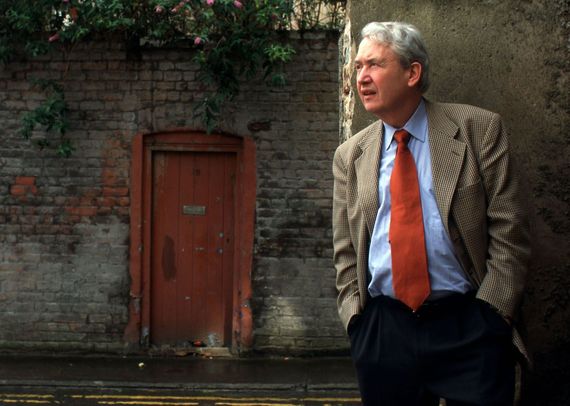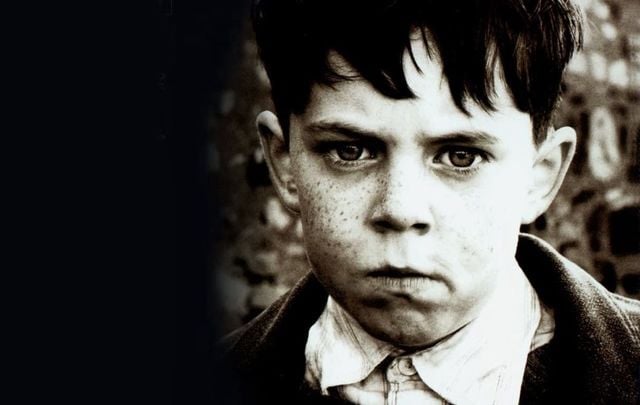The tale of how the Lion's Head bar, along with three women Mary Breasted, Molly Friedrich, and Ellen McCourt, led to the publication of "Angela's Ashes: A Memoir", published back in 1996.
Editor's Note: This is an excerpt of Dermot McEvoy’s book "Real Irish New York," published by Skyhorse Publishing.
It’s hard to believe, but 2021 marks the 25th anniversary of the publication of "Angela’s Ashes".
It seems like only yesterday when the book exploded on the worldwide Irish community like a ton of peat. It was hailed by most, but also criticized as an unfair depiction of de Valera’s Ireland by others.
And how does 66-year-old virgin Irish author Frank McCourt go about being published at all?
Well, here’s the inside story—as told by the three extraordinary women responsible: Mary Breasted, Molly Friedrich, and Ellen McCourt.
Who can forget that first page of Angela’s Ashes?
“It was, of course, a miserable childhood: the happy childhood is hardly worth your while. Worse than the ordinary miserable childhood is the miserable Irish childhood, and worse yet is the miserable Irish Catholic childhood.”
It could be said that Angela’s Ashes was conceived and delivered by a great New York Irish saloon down on Christopher Street called the Lion’s Head.
I was first introduced to Frank McCourt at the Lion’s Head by bartender Mike Reardon in 1975. At the time Frank was a teacher at Stuyvesant High, a school noted for its brainy clientele. Frank was very soft-spoken, and it never occurred to me that he was the brother of the brash, rambunctious Malachy, who at that time was causing havoc with his radio show on WMCA Radio and his saloon, The Bells of Hell, up on 13th Street. I saw a lot of Frank in the latter part of the 1970s because he was also a friend of my friend, the writer Ralph Tyler, whose son Mike was a student of Frank’s at Stuyvesant.

Frank McCourt, author of "Angela's Ashes: A Memoir".
The Lion’s Head was known as a “writer’s bar.” It may have had something to do in that it was right next door to the old office of the Village Voice. Writers would get their meager checks from the Voice and walk right into the Head, as it was affectionately called, cash it, then drink it.
Voice writers like Joe Flaherty found the Head to be a second home. On any given day or night there might be Pete Hamill at the bar, slinging whiskeys along with the likes of poet Joel Oppenheimer or novelist David Markson. At cocktail hour super literary agent Knox Burger would bring his writers around. One day it might be Martin Cruz Smith who wrote the mega-bestseller Gorky Park or Vincent Patrick, author of The Pope of Greenwich Village. Dinnertime might bring in Norman Mailer or playwright Lanford Wilson. If you were lucky, the literary talk might be serenaded by the Clancy Brothers.
Writers soon began to bring jackets of their books and scotch tape them to the wall. Al Koblin, one of the partners who owned the Head, started putting them up on the wall in frames. I remember the first one was Fred Exley’s "Pages from a Cold Island", his follow-up to his renowned "A Fan’s Notes". Pretty soon the back wall was full, and the jackets were creeping to every available space in the joint. I remember Frank enviously looking at that beautiful wall, a glassy, gorgeous mosaic of books, and saying to me, “Someday.”
The Head would play two important parts in the creation of "Angela’s Ashes". First, Frank would meet his wife, Ellen Frey, there in December 1989. She would be the catalyst that brought forth the book. “I really think Ellen was the real muse and genius of all this,” says writer Mary Breasted, “creating an atmosphere of ease and happiness for Frank that just put him into the exact right mood to get his book done.”
“In October 1994,” wrote Jim Dwyer in the New York Times at the time of Frank’s death in 2009, “two months after they were married, he began Angela’s Ashes, rising early, sitting with a board across his lap, writing longhand. ‘He’d bring me coffee in bed in the morning—he liked to say he was the perfect husband—and then he would read me the work from the day before,’ Ellen said.”
The second major event in the birth of Angela’s Ashes was his friendship with Mary Breasted who was also known to belly up to the bar at the Head.

Looking for Irish book recommendations or to meet with others who share your love for Irish literature? Join IrishCentral’s Book Club on Facebook and enjoy our book-loving community.
Mary Breasted Is asked to take a look
“It seems to me that I always knew who Frank McCourt was from the first or second year I made it into the Lion’s Head,” Mary Breasted told me. “I lived up the street from the Head in 1968-1969, and I was writing for the Voice, so the Head was my local restaurant and pub, anyway.
“My first memory of Frank,” she continued, “was probably after I’d gone to work for the New York Times as a general assignment reporter under City Editor Crazy Arthur Gelb. It was on a night when I was standing with the guys by the bar doing that fast talk we all liked to do in the evening when we had finished work, gossip and rants and one-liners about our idiot editors or our even greater idiot political representatives. We would get, or I would get more and more outrageous as the night wore on, and I seem to remember that on that particular night when I was being shocking, probably loudly denouncing my bosses, I noticed Frank just leaning against the wall with maybe a beer in his hand looking at me with his amused sizing-us-up expression. ‘That’s Frank McCourt,’ one of the guys said. ‘He’s a school teacher. But watch out for him. He’s writing a book. He could put you in it.’
“But Frank and I hardly ever talked to each other in those days,” continued Breasted. “He was quieter than most of the Lion’s Head wits, at least that I can remember from the 1970s. I really only got to know Frank and to begin to pay attention to the way he talked after I met Ted Smyth, the young Irish diplomat…Anyway, in November 1978, I fell under the spell of Irishry, chiefly represented by Ted, but Ted was at the center of a circle of funny, smart, fast-talking men that included Terry Moran and Malachy and Frank. So, from then on, I saw the McCourts quite often. It took a while for me to realize that the most literary one of them was Frank because Malachy was so entertaining and usually hogged the stage in our circle.”
It was at a party after Mary and Ted married in 1981 that Breasted discovered Frank McCourt’s magic. “We were at a party in the posh Upper East Side apartment of the Irish Consul General Sean O’Huiggin and his lovely proper and proud former TV presenter wife, Bernadette. Frank and Malachy were there. They seemed a little restless in the elegant setting. Frank asked Bernadette where someone was. ‘He’s in the library,’ Bernadette said. ‘Down the hall. It’s the room with all the books.’
“Frank used to repeat this remark pursing his lips like a snooty Dublin matron,” recalls Breasted. “It tickled him that anyone would have to tell him, a Stuyvesant English teacher, the library was the room with all the books.
Handing off to Molly Friedrich
“It arrived in a brown envelope,” Breasted recalled. “I remember I waited to open it until the kids were asleep. I brought it to bed with me, a little apprehensive. Ted and I were very fond of Frank. What if I didn’t like his book? Ted fell asleep, and I thought I would soon be asleep, too. But of course, I stayed up half the night reading. I knew what I had in my hands. It was a work of lyric and comic genius. Frank had the instincts of a poet, never to say too much, never to tell you what you should be feeling, just to give you the evidence, the taste and smell, and sound of it all. And he had that transcendent humor that made the terrible story bearable and the teller completely loveable. Putting the tale into the voice of a child but also the man remembering the child was the real art of it.”

Frank McCourt, author of "Angela's Ashes: A Memoir".
The next morning Breasted rendered the verdict to McCourt. “I called Frank as soon as I had got the kids to school. I told him what I thought. ‘Do you have an agent, Frank?’ ‘No,’ he said.” Luckily, Breasted had “a friend down the road.”
Mary’s editor at the time, the eminent Aaron Asher of Harper & Row (also editor to Saul Bellow, Philip Roth and Milan Kundera), had told her agent, Dan Green, that “Irish books don’t sell,” and indeed, Green faced 15 rejections before he sold her Irish novel. Mary decided this ordeal would make it hard for him to look fondly at Frank's manuscript.
Breasted’s friend down the road was literary agent Molly Friedrich. “I knew Molly had sold a fine memoir by an unknown woman writer Esmeralda Santiago, called When I was Puerto Rican. It was doing splendidly. But I didn’t know Molly all that well. Her daughter Julia had been babysitting our children sometimes. Julia was in 9th grade at their school, so I saw her often. During the week, I told her I had a manuscript that I thought was really good and I might want to show it to her mom. Did she think Molly would mind? ‘Just bring it to her, Mary. Bring it to her. She stays home on Fridays.’ ” When Breasted showed up at Friedrich’s doorstep “Molly gave me a pained look.”
“A memoir by an unknown writer set in Ireland in the 1930s?” she said. “Tell him I might not get back to him very fast.”
“Just read the first five pages, Molly. Read the first five pages,” I said.
She called me Monday morning: “Mary, how do I reach Frank?” Her voice sounded as though she had just come from the scene of a terrible accident. “Oh, my God, this book!”
Ashes comes to Molly Friedrich in a time of tragedy
It is ironic that Angela’s Ashes, a book about the tragedies of life, came to literary agent Molly Friedrich in a time of personal tragedy. Molly’s father, Otto Friedrich—journalist, writer, historian, author of 14 books, and one of the great American intellectuals of the 20th century—passed away just as Angela’s Ashes came into her life.
“My father, Otto Friedrich,” Molly told me, “died at age 66 on April 26th, 1995. He’d gone into the hospital that Easter Sunday because he wasn’t able to handle the pain. Like so many men of his generation, he’d assumed that his pain was the pain of creaky aging, poor health habits, you know, drinking and smoking throughout his adulthood finally catching up with him. Within about an hour of his arrival in the hospital, the doctors had located cancer throughout his body, he died a few days later. I was very close to him and also perhaps imprudently represented him as his agent. We were all of us in deep, abiding shock and he’d left his estate in complete chaos. Hating the stock market, he’d opened more than thirty accounts, he even had war bonds, for crying out loud! My strongest memory of my mother at that time—who died, also youngish, fewer than 18 months later—was her shifting bills and insurance claims from one end of the dining room table to the other, paralyzed and grief-stricken.”
Enter Mary Breasted and a tattered “partial” manuscript.
“Anyway,” Molly continued, “it was into this chaos and sadness and shock that my friend Mary Breasted walked into my kitchen in Mount Kisco, New York. She lived just around the corner and we had an easy, casual kind of friendship, dropping by unannounced was not unusual. She was carrying an envelope in her hands as she emerged from the car. I honestly thought she’d arrived to give me a hug, but no, she was determined to get me to read her friend Frank’s partial manuscript. I stared at her and said, ‘Mary, do you realize that my father died just two days ago?’ She had realized this and yes, she was terribly sorry to hear that, but wouldn’t I please read her friend Frank’s manuscript?
“I was livid and pissed off and astonished by the depths of her tone-deafness, at her importunate, nearly messianic determination to get Frank’s manuscript read. I remember asking her what the book was about, and whether anyone had ever heard of this guy?
“Above all - we were wet”
“This was all of course, in 1995, way before the blandishments of poorly written blogs passing themselves off as publishable books, before the over-used words like brands and platforms had invaded our industry. Still, her answers were truly dispiriting—siblings had died, he’d returned to Ireland to starve with other siblings, etc. Mary did, of course, become positively rhapsodic about the writing but I was only half-listening, I was just too cross with her insensitivity to my own overshadowing grief. I had already received over four hundred condolence notes from writers and editors who’d known my father and I’d been elected by my family to plan a memorial service.
“To get Mary to stop muttering about the wonders of this manuscript,” Molly continued, “I just rudely took it from her hands and left her standing in the driveway. I brought the manuscript into my kitchen and then became even angrier. It was single-spaced, 125 dense-looking pages on onionskin typing paper. Because it had been typed on some ancient machine, all the ‘o’s had been punched out, the pages looked like an angry crow had pecked at them. So I left it in my kitchen for two whole days, sitting under a large, rectangular can of Berio Olive oil. When I realized that the first page had a ring of greasy olive oil on it, I decided to take it upstairs to my bedroom, where all my most consequential reading happens.”
Not surprisingly after nearly a quarter-century, Mary Breasted memory of the delivery of the sacred manuscript is a little different. “I also have no memory of my having known at the time that Molly’s father had just died,” Breasted told me. “I know I read the obituary in the paper and then spoke to her about it and of course expressed huge sympathy. The obit ran that day, but I think I would have remembered then being aware of it as I approached her house with Frank’s brown envelope. I think I didn’t see the obit page until later, but Molly could well be remembering this more fulsomely than I. Anyway, I was surprised to read about myself being such a total creep in a scene I don’t remember. What I remember about the encounter was that I had briefly told her the barest minimum of Frank’s story over the phone and that our conversation on the doorstep was very succinct. Molly stood in the open door, and I handed her the envelope. Maybe I praised the writing, but I thought I just urged her to read the first five pages as I was backing out of the door she was trying to close.”
“I do remember,” Friedrich remembered, “quite vividly, my experience of reading that first page! When I got to that fourth paragraph, ‘Above all—we were wet.’ I put the parchment-like page down in my lap and just started shaking, it was so transparently obvious that I had stumbled, kicking and screaming in low-grade resentment, onto a truly great piece of writing. I had no idea if the writing could be sustained at such perfect pitch, but I was vibrating with the thrill of a possible great discovery. It was finally here, a non-posthumous classic, waiting to be born! I kept reading, savoring every word, slowly turning over each crackling page, with the little punched out ‘o’s’ all over my quilt.
“Of course,” she continued, “I called Frank the next morning and got Ellen on the phone instead. I was babbling incoherently about the wonders of this partial memoir, while Ellen laughed her great, gulping guffaw, saying, ‘Well, Molly, great! We love it, too!’
“We met, Frank and I, just a day later, I wasn’t about to let another patch of moss grow under my feet, I was too hysterical, Now I understood the gleam in Mary Breasted’s eye. Frank wanted to know how I might sell it, I told him I had no clue but sell it, I would.”
On the wall at last
The Lion’s Head closed on October 12, 1996. Months before its demise Frank McCourt’s Angela’s Ashes became the last book by a regular to mount the authors’ wall.
“Frank was very proud of just that moment,” Ellen McCourt told me. “It was ‘like winning the Noble Prize,’ he said.”
’Tis.
For the full story, read more about it in Real Irish New York which is available in hardcover and Kindle from Amazon.com.
*Originally published in September 2021. Updated in November 2023.
*Dermot McEvoy is the author of the recently published "Real Irish New York: A Rogue’s Gallery of Fenians, Tough Women, Holy Men, Blasphemers, Jesters, and a Gang of Other Colorful Characters." He is also the author of "The 13th Apostle: A Novel of Michael Collins and the Irish Uprising," and "Our Lady of Greenwich Village," both now available in paperback, Kindle, and Audio from Skyhorse Publishing. He may be reached at [email protected]. You can follow him on his website and Facebook page.




Comments